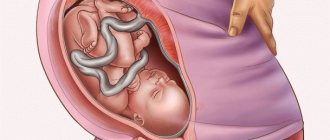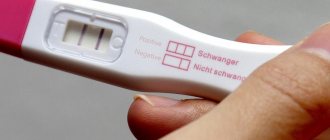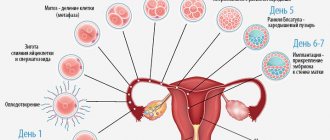Fetus at 9 weeks of gestation: weight and dimensions
You know that a child’s brain is already almost like an “adult”: it has two hemispheres covered with convolutions. And this week the cerebellum (which is responsible for coordinating movements) and the pituitary gland (in which the first hormones will be produced) will begin to form. The fetal brain already sends signals to the mother's body indicating its needs. Most scientists are inclined to think that this explains the gastronomic quirks of a pregnant woman. The central nervous system also continues to develop. In particular, cranial, spinal and intervertebral nerves are formed. The development of bone and muscle tissue continues at the 9th week of pregnancy. The baby's limbs lengthen, with his arms longer than his legs, and seals form at the ends of the fingers, from which marigolds will later form. Interestingly, they are located on the fingers from the palms and soles for now, but gradually the nails will move to the outer side - where they should be. The baby holds his hands bent at the wrists at the level of the heart. He can already bend and unbend them. The elbows and forearms are clearly visible, and the feet are slightly longer. The growth and development of the heart continues, the umbilical cord also increases - both in length and in diameter. The site of adrenaline production is formed - the middle layer of the adrenal glands. By the way, the child can already urinate on his own: waste products are excreted through the umbilical cord to the mother’s body. The load on a woman’s kidneys increases, which will continue until the very end of pregnancy. Already this week, the placenta begins to function, but it has not yet taken over all the necessary functions. At the 9th week of pregnancy, the rudiments of the mammary glands appear, as well as the lymph nodes - the first lymphatic cells are formed. The genital organs are forming: the boy’s testicles are still located in the abdominal cavity, but then they will descend. The face also continues to improve. The mouth becomes smaller and lengthens, the corners and lips are visible, it already opens and closes: the baby can swallow and wrinkle his lips. But the eyes are closed for centuries and will not open soon. But lobes are already forming on the ears. Of course, the head is still large, but gradually it becomes more human-like. The baby is still very tiny - he is still only 7 weeks old. The entire fetus weighs about 2 g and by the end of the 9th week of pregnancy grows to 22-30 mm.
How to proceed? Brown spot at 9 weeks
In such situations, I can’t believe that I live in the 21st century and not in a distant village of the country. And I have to find out the reason myself or with the help of other girls. The light beige discharge began to bother me on August 23 (one-time), after which I went for an ultrasound on August 24 (at 6+4) and was reassured that there was no reason to worry. On August 27, I decided to go for a consultation with a gynecologist (I was embarrassed by the slight but significant decrease in progesterone), and they prescribed me Utrozhestan 100 mg vaginally at night. After a few days, beige discharge in the evenings had already become a habit, but it was a weak spotting (I reassured myself that maybe my grade 1 cervical dysplasia was behaving this way). A reaction to Utrozhestan can... In short, it smeared every day, I waited two weeks and went for an ultrasound (07.09), this was at 8+4 weeks, again according to the ultrasound everything was fine: no polyps, no hematomas, no detachments. I think - ok, you need to put your suspiciousness away and not pay attention. At exactly 9 weeks I decided to register (September 10) so that they could start studying me. Until I got to the clinic with my husband (on the pad I found that the discharge was no longer light beige, but closer to brown). She said, but did not show it to the gynecologist, she suggested that I carefully look on the chair and take a smear, I agreed. Indeed, she carefully inserted this “plastic”, said that the cervix was closed and did not look or touch anything else there. I didn’t see dysplasia, they say it didn’t exist (well, you never know, I had it two years ago). I removed the discharge directly from this thing (sorry, too lazy to look for its exact name). And that’s it, as it were!! I registered it, wrote out all these directions, etc. I left the clinic again without any information: what’s wrong with me???? How so, girls?? The whole evening it smeared again and was already brown, I didn’t put it in, but drank morning. Later I discovered a long “nozzle” with brown discharge, like a vein). Before going to bed, I thought about increasing my support and in the morning I decided to add 100 mg (inserted vaginally). Now I have 200 mg per day, I am my own doctor((((What do you advise in my situation? I don’t strive to continue the pregnancy if it is defective and so on, I want to find out the cause of the discharge (maybe it’s simply a lack of progesterone, but I was beaten, I definitely don’t want to lose because of this baby!!) In the end, I have had irregular cycles all my life, hormonal insufficiency occurs. Go for an ultrasound unscheduled (but what will they see again?), or for an examination to a private clinic (let them look for the source of the spotting?), or wait a few days after increasing the dose of utrozhestan, what will the results be? they supposedly see why it’s smearing (what the hell?). I’ll listen to your advice, recommendations, what you should do, or do in similar situations?? Thank you!
Future mom
You are also growing: your weight and dimensions gradually increase, your tummy begins to round, your breasts become heavier and swell, because very soon you will have to feed your baby, and the body begins to accumulate the necessary reserves. At this time, a woman’s breasts can become especially sensitive, so buy special bras without unnecessary seams and only made from natural fabrics, and replace them with larger ones in time. Do not be afraid of the appearance of a venous network on your chest - it will disappear later. But if you are predisposed to varicose veins, then this sign cannot be ignored.
Lower back pain
At this stage of pregnancy, a woman may feel pain in the lower back, the main reason for this phenomenon is considered to be weight gain. During this period, it is worth considering that the baby’s bones and muscles need a sufficient amount of calcium, the source of which is the body of the expectant mother.
Based on this, a pregnant woman’s diet should include a large amount of vitamins and minerals. After all, a deficiency of these substances usually causes a breakdown in the composition of bone tissue and its weakening.
Feelings at 9 weeks of pregnancy
If in previous weeks the expectant mother was tormented by toxicosis, its symptoms still persist: she still feels sick in the morning, certain smells cause the usual disgust. As before, a woman can surprise her family and friends with her gastronomic preferences and food “combinations”: herring with an orange? This is so delicious now! Trips to the toilet are becoming more frequent: the kidneys of the expectant mother are now forced to work for two, so she has to go to the restroom twice as often. Periodically, attacks of dizziness and a feeling of lack of air may still occur. The body slowly begins to deposit fat reserves: the usual clothes become more and more tight. However, this is certainly not a signal that you will have to eat less - fat reserves are necessary for normal bearing of the baby and subsequent lactation after the birth of the child! Therefore, now you don’t need to get carried away with diets, but think about changing your wardrobe and switching to more spacious and loose clothing made from natural materials. In addition to the already manifested symptoms of pregnancy, new ones may be added, in particular, pregnant women’s runny nose and sleep disturbances. If you are simply knocked off your feet by the desire to sleep, try to eat more protein foods. And start preventing constipation before it’s too late. It doesn’t hurt to develop the most optimal daily routine, which involves a long stay in the air, proper sleep and rest. Walk a lot, avoid stress and irritation, eat well, get enough rest, do not lift heavy objects, try not to walk or stand for long periods of time. And don’t forget about skin care, and hygiene in general.
Pregnancy 9 weeks mother's nutrition
At this stage, the expectant mother no longer has enough energy reserves in the body, so they have to be replenished by consuming more food. However, the choice of products should be approached very strictly, ensuring that they are environmentally friendly, healthy and natural.
Nutrition at the 9th week of pregnancy, due to the manifestation of early gestosis, may differ radically from the usual menu due to the fact that many favorite foods begin to cause disgust. And those that a woman previously did not like at all, on the contrary, will be among her favorites. In addition, unusual taste preferences may appear, based on the desire to consume foods that are completely incompatible with each other.
In order for nausea to stop bothering a woman during the 9th week of pregnancy, she should eat small portions as often as possible. Breakfast should be replaced with a glass of water with lemon and a cracker. Nutritionists advise pregnant women to divide one meal into three stages, with intervals between them.
You should give preference to steamed dishes, whole and natural products, represented by vegetables, grains, fruits, fresh juices, fermented milk, boiled meat and low-fat fish. Porridge and bread should be whole grain. The above products are very useful for both mother and baby, as they contain vitamins, enzymes, minerals and other biologically active substances that are necessary to maintain the normal development of the fetus and the health of the pregnant woman.
You should exclude sausage, pasteurized juices, canned food, margarine, smoked meats, spices and mayonnaise from your menu. By consuming environmentally friendly products, the expectant mother will be able to prevent the development of abnormalities in the future baby, and will also minimize the development of various defects in the baby. Fried foods and alcohol should be completely avoided during the 9th week of pregnancy.
Belly at 9 weeks of pregnancy: tugs, hurts
Abdominal pain of various types is not uncommon for pregnant women in the early stages. But it’s one thing if these pains are associated with weakening and stretching of the ligaments that hold the uterus, because such pains do not pose any danger. In this case, painful sensations arise periodically, are localized more often on the sides of the abdomen, but can also radiate to the lower back, creating discomfort in the groin area. It’s worse when the stomach feels tight and painful in the 9th week of pregnancy, similar to how it can hurt during menstruation. Dull, aching or cramping pain above the pubis or lower abdomen most often indicates increased uterine tone and the associated risk of spontaneous abortion. If such symptoms appear and do not stop, you should definitely go to the doctor for examination, and, if suggested, be sure to go to hospital. An immediate response is also required by the appearance of brown discharge, or, worse, blood, against the background of nagging pain in the abdomen. Vaginal bleeding, and even in the presence of cramps in the lower abdomen, is a sign of an incipient miscarriage; calling an ambulance in such a situation is necessary.
Discharge during pregnancy with IVF
Artificial insemination involves the implantation of an embryo into an organism that has not gone through natural changes. Therefore, on the eve and in the first weeks after conception, a woman takes hormonal medications to create conditions for maintaining pregnancy. But the endocrine system is very complex, so after IVF, placental abruption and miscarriage often occur at 6-8 weeks.
Minor light brown discharge 7-14 days after embryo implantation is normal and caused by changes in the body.
Fact! In most cases, IVF is not limited to a one-time attempt, because the pregnancy is terminated.
Discharge
Discharge at the 9th week of pregnancy, which does not pose any danger - discharge in moderate quantities, light, milky in color, without a strong pronounced odor. The appearance instead of yellow, green or purulent, bubbling or cheesy discharge with an unpleasant odor, and even against the background of severe discomfort in the form of burning or itching in the genital tract, is evidence of the development of one of the infectious diseases that awaits a woman. This cannot be done without the participation of medicine - having identified the pathogen and diagnosed the disease, the doctor will prescribe adequate treatment to prevent infection from reaching the fetus. Of course, there can be no talk of spotting in the 9th week of pregnancy: menstruation has long since ceased and should not have happened, and blood on panties, even in the form of spotting brown discharge, is a reason to seek medical help as soon as possible. You should especially react promptly if spotting brown discharge or bleeding appears in parallel with abdominal pain - almost certainly there will be a risk of miscarriage. Bloody discharge can also be caused by erosion of the cervix, indicating any unfavorable neoplasms. But if the appearance of blood is associated with erosion of the cervix, there is no pain in the abdomen. Be that as it may, there should be no bleeding at all, and the cause of their occurrence should be trusted to be determined by a doctor, to whom you should be sent immediately upon detection of blood.
Causes of pain
A woman at 7 weeks pregnant has already become accustomed to her condition. Most likely, she has already heard the baby’s heartbeat and is in an elevated state. However, she still has 33 long weeks ahead of her, and there is no way to let down your vigilance towards yourself. The tummy has already become slightly rounded, the breasts have enlarged, and the areolas of the nipples have darkened. Inside her is an almost fully formed baby. The state of health during a healthy pregnancy, if there is no toxicosis, is no different from usual. However, during this period, some women experience pain.
Important! The causes of pain can be different - ranging from pathological pregnancies - ectopic, frozen, ending with banal flatulence.
The seventh week of pregnancy is characterized by the beginning of more intensive growth of the uterus. In this case, stretching of the tissues of both the organ itself and the ligaments that support it occurs. In this case, the woman may feel a slight tingling in the lower abdomen or stretching from the sides. Such pain is not intense and does not cause much discomfort. They go away with a change in body position and are not accompanied by suspicious discharge.
Ultrasound at 9 weeks of pregnancy
Sometimes an ultrasound examination may be needed to diagnose and evaluate the progress of pregnancy. Using an ultrasound, a specialist will assess the condition of the uterus and fetus, make forecasts for the future, and more accurately determine the duration of pregnancy. In addition, it is now possible to evaluate the motor activity of the embryo - an ultrasound examination will show how the baby moves its arms and legs, and will show whether the baby is sleeping or awake. Although the woman, of course, will not feel this “awakeness” yet - the movements and tremors of the baby will become noticeable only by the 4-5th month of pregnancy. But now, during an ultrasound session, the expectant mother can already see the outlines of the baby, hear how quickly his tiny heart beats: at this stage, the fetal heart rate averages 130-150 beats per minute.
Analyzes
If you are still up and counting, then the 9th week of pregnancy is just that time. The antenatal clinic prescribes a set of tests that the woman must undergo in order to know the condition of the fetus and whether there are any possible threats. Most women, seeing the list of tests and doctors, begin to worry and decide which tests need to be taken this week and which not. But it is worth considering that all the tests that a specialist prescribes do not harm you or your unborn child in any way. This is necessary in order to know whether there are threats to the health of the fetus.
Usually, in the 9th week of pregnancy, a doctor prescribes a blood test, but only if the woman did not take one last week. A urine test and blood samples from a vein are taken. If the doctor finds abnormalities in your blood, you may have anemia or an inflammatory process is occurring in the body. In this case, the specialist prescribes a number of additional tests.
Stomach ache
In some cases, abdominal pain is normal. Therefore, if at the 9th week a woman feels a nagging pain, which appears rarely, and there is no bleeding, then most likely this is a sign of a growing uterus affecting the muscles and ligaments. In some cases, women had painful menstruation before pregnancy, so in the initial stages a woman may feel a pulling and tingling pain.
In case of cramping pain that is accompanied by bloody discharge, you should definitely visit a doctor, as this is the first sign of a threatened miscarriage. If pain appears in the upper abdomen, then most likely this is a sign of exacerbation of the gastrointestinal tract; digestive problems are also possible. During pregnancy at 9 weeks, the expectant mother may be bothered by constipation and pain in the intestines. Try changing your diet, but if that doesn't help, see your doctor.
Discharge in the ninth week
Normal vaginal discharge may change in nature. Heavy mucous discharge in the first trimester is considered normal. Due to the increased level of progesterone, the secretions thicken in order to protect the fetus from infection. Starting from the second trimester, the discharge becomes thin and watery. Leucorrhoea may be whitish, this is considered normal if there is no pronounced odor. Pathology is also indicated by discharge accompanied by itching, burning and swelling in the genitals. It is also necessary to consult a doctor if the discharge becomes green, brown or red. In this case, the specialist will prescribe a smear test to identify possible infections.
Possible problems
At the 9th week of pregnancy, a woman may be bothered by thin and heavy discharge. This may be a symptom of vaginosis, especially if there is an unpleasant fishy odor. This disease is vaginal dysbacteriosis, that is, it involves the displacement of normal microflora by opportunistic pathogens. Most often, dysbacteriosis is accompanied by gardnerella, microorganisms whose pathogenicity is still debated in the scientific world.
According to medical statistics, a third of healthy women are sown with Gardnerella. A characteristic sign of dysbiosis during microscopy of a vaginal smear are key cells - these are desquamated cells of the vaginal epithelium, colonized by microflora, often rods. Vaginosis is when normal microflora (lactobacteria) leaves the vagina and the pH shifts strongly to the alkaline side.
After treatment of dysbiosis, repeated recolonization of the vagina by Gardnerella is possible, since they are found in cultures of samples from the woman’s rectum, as well as from the urethral canal of her sexual partner.
Treatment of vaginosis involves taking antibacterial drugs, normalizing the vaginal microflora, and treating intestinal dysbiosis. Throughout pregnancy, a woman should drink fermented milk products containing colony-forming units of Bulgarian bacillus every day.











